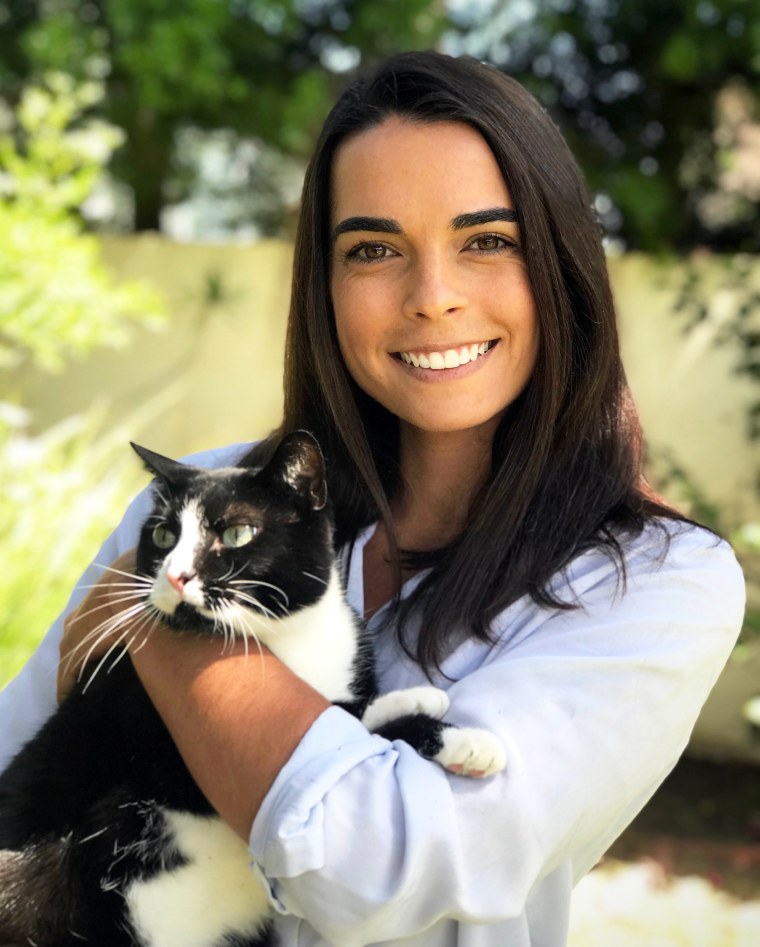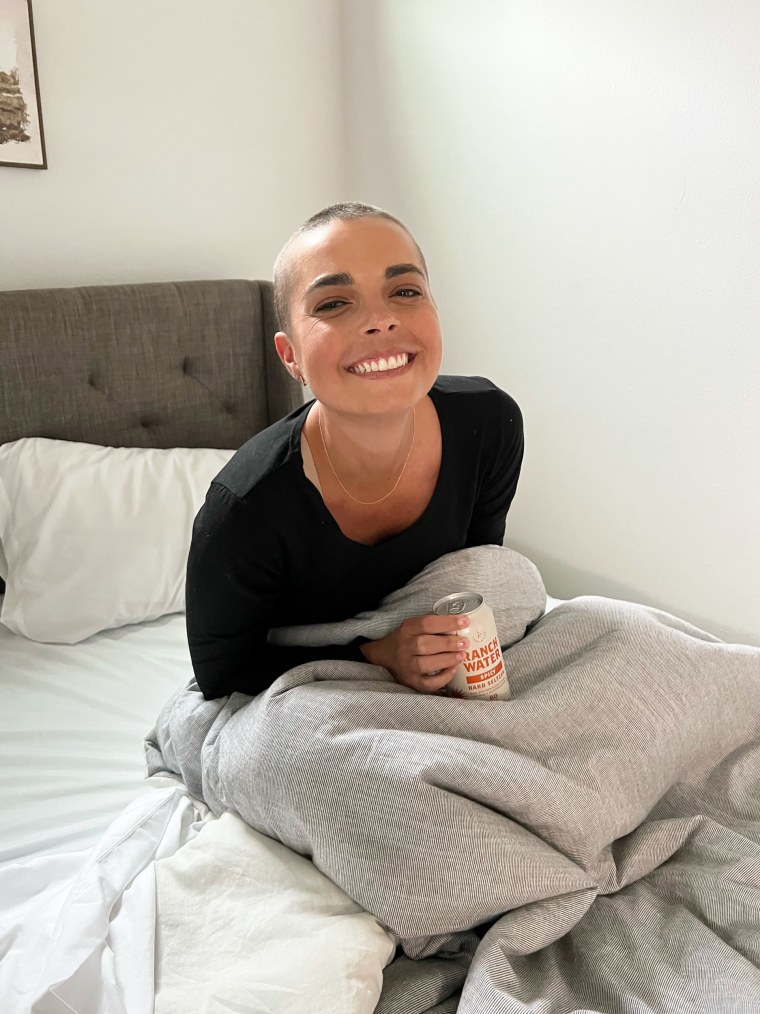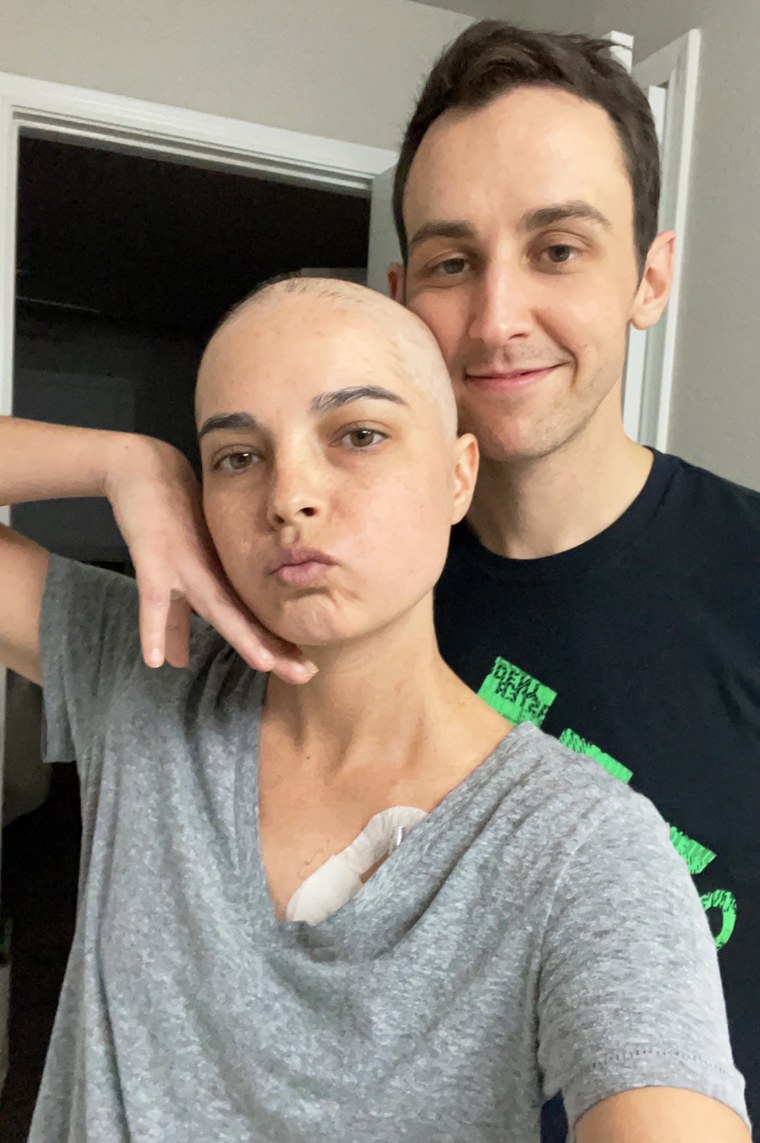When Raquel Doke first noticed her face was puffy in April 2022, she chalked it up to a reaction from too much salty food. Months later, the veterinary resident, now 28, would be diagnosed with stage 4 adrenocortical carcinoma, a rare type of adrenal cancer.
In the spring of last year, Doke was completing a residency program at Iowa State University when her life took a sharp turn. “Ironically, I was training in medical oncology when I was diagnosed with cancer,” says Doke.
However, Doke's early symptoms did not initially raise alarm.

Subtle symptoms
In April 2022, Doke says she noticed her face looked swollen and rounder than usual. “I got (takeout) for the first time in a long time, and the next morning was when I first noticed my face was puffy, so I thought it was because I had salty food,” says Doke. But the puffiness didn’t go away.
Doke then noticed bloating and discomfort in her upper abdomen. “I ordered a dress in my size, and when I tried to zip it up, I couldn’t fit into it anymore,” says Doke, adding that she was unaware a large tumor was causing her abdomen to protrude.
Additionally, she started experiencing insomnia and an abnormal menstrual cycle. In May, she finally saw a doctor.
Doke, who has an underlying heart condition, says her provider did a variety of diagnostic blood tests, X-rays and an echocardiogram. “Nothing was coming back abnormal so it wasn’t my heart ... but I knew that something was wrong,” she recalls.
By June, Doke's menstrual cycle had stopped entirely. “I knew it was something with my hormones,” she adds. After doing more research and tapping into her own medical knowledge, Doke says she suspected polycystic ovarian syndrome (PCOS) or Cushing disease — which can both affect the hormones and menstrual cycle.
Doke says she couldn’t get in to see an endocrinologist for several months but was able to convince her provider to give her a salivary cortisol test to see if she had Cushing disease, a disorder where the body makes too much of the hormone cortisol.
The morning after dropping off her saliva sample, Doke had severe pain in her left abdomen. After doubling over on the floor in pain while trying to measure a dog’s lymph nodes, Doke rushed to the emergency room.
“At the ER, they ordered a CT scan of my abdomen, and they saw that I had an adrenal tumor and I was internally bleeding,” says Doke. She had a large hematoma, or a pool of clotted blood, in her abdomen.
Doke underwent an emergency procedure to stop the bleeding and was transferred by helicopter to the University of Iowa, where doctors decided the hematoma made it too risky to remove the mass on her adrenal gland right away. She was moved to the intensive care unit.
“They wanted to do more tests to figure out what exactly they were dealing with before they cut into me,” says Doke, adding that the doctors were "99% sure" it was adrenal cancer.
The salivary cortisol test she had taken came back very high, Doke says, and she was diagnosed with Cushing disease, in addition to adrenal cancer. In Doke's case, her Cushing disease was caused by her adrenal tumor.

What is adrenal cancer?
Adrenal cancer is a rare cancer that can affect one of both of the adrenal glands, which sit on top of the kidneys and produce hormones that regulate essential body functions, per the Mayo Clinic. The type of adrenal cancer Doke has, adrenocortical carcinoma, grows on the outer layer of the gland.
“They found evidence that the tumor was actually secreting hormones — cortisol and androgens — which were causing the symptoms, like swelling,” Dr. Matthew Campbell, associate professor in the department of genitourinary medical oncology at MD Anderson and Doke’s oncologist since October 2022, tells TODAY.com.
According to Campbell, the adrenal glands follow instructions from the pituitary glands to make hormones like cortisol, which is involved in blood pressure control. But adrenal tumors like Doke's don't rely on instructions from the pituitary glands, so "they start secreting these chemicals on their own,” says Campbell.
The excess cortisol production leads to Cushing disease, which can cause high blood pressure, high blood sugar, muscle weakness, facial redness, weight gain and thin skin, Campbell says.
How is adrenal cancer treated?
Treating this type of cancer often involves surgery, chemotherapy, and controlling cortisol levels, Campbell says. “In some ways, we're fighting two problems. … The cancer itself and the hormones the cancer is secreting,” he adds.
Doctors may remove the original tumor to reduce the amount of cortisol produced, says Campbell, but cutting out large tumors like Doke’s can be risky or cause the cancer to spread. “These tumors are at extremely high risk of rupturing in the operating room, and if they do, they can leave behind cancer cells that begin growing throughout the abdomen,” says Campbell.
“This is a very rare tumor, and a lot of people have hesitation about the first move. … There was concern based on her initial scan that surgery wasn’t going to be the best initial plan,” says Campbell, adding that surgery should only be performed by a surgeon with a lot of experience treating this cancer.
In June 2022, Doke was transferred to the Mayo Clinic, where doctors tried out different therapies. “I entered into a clinical trial where I was receiving immunotherapy and a drug that is not yet approved for the treatment of Cushing’s disease,” says Doke.

In August 2022, Doke says she developed congestive heart failure, and her Cushing’s was progressing. “My face started getting much bigger, I got acne, I had extreme muscle wasting,” says Doke. An MRI showed that the cancer was stage 4 and had spread to her liver, she says.
“At that point, the doctor I was seeing said I have maybe one year left … which was really scary and upsetting,” says Doke. Based on her own medical knowledge, she was hesitant to try chemotherapy because she thought it would only shrink her tumor at best and would severely diminish her quality of life.
“I felt like we weren’t going to have an adequate chance for treatment until the tumor was removed," she adds.
In late August, Doke finally found a surgeon who was willing to remove her tumor, she says. “We scheduled the surgery for the end of August, a week before he was about to retire, so I got super lucky,” says Doke.
During the five-hour surgery, doctors removed a 13-centimeter adrenal tumor, one kidney, part of her diaphragm, several lymph nodes, lesions on the liver and part of her vena cava (the body’s largest vein). The recovery was long and difficult, Doke says.
“A month after my surgery, we saw that I had disease progression in my liver, so at that point I needed chemotherapy,” says Doke. In October, Doke relocated to Houston to be treated by Dr. Campbell.
After freezing her eggs, Doke started oral and intravenous chemotherapy in November 2022. Doke says the side effects, especially losing her hair, were "traumatizing." She did six rounds of the IV chemo, and now she's doing IV immunotherapy in addition to the oral chemo.
“At this time … she is in a deep partial remission from her cancer, and we are following her carefully,” says Campbell.
At the end of April 2023, Doke is scheduled to have an ablation procedure, which involves using heat to kill tumor cells. "Hopefully that will help me progress from partial remission,” she says.

Adrenal cancer prognosis, incidence
The prognosis for adrenocortical carcinoma varies widely, says Campbell. Once the cancer has spread outside the adrenal glands, patients can live for as little as three months or past five years, he notes. “The majority of patients will succumb to their cancer within a year to three years of diagnosis,” says Campbell.
There are only one to two cases per million U.S. citizens per year, says Campbell. “Many primary care providers never see a patient with adrenal cancer, and the majority of oncologists may see one or two patients in their careers because it is so rare,” he adds.
There are an estimated 400 to 600 cases annually in the United States, says Campbell, and about 60% of those are women.
It’s not clear exactly what causes adrenal cancer, and most cases are sporadic, but certain genetic syndromes can increase the risk, says Campbell. Adrenal cancer can occur in people of any age, including young children, he adds.
Adrenal cancer can be difficult to diagnose especially early on, says Campbell. “The cancer grows in an area of your body where it doesn’t tend to cause a lot of symptoms,” he adds. Moreover, the symptoms of the cancer and hormonal changes can be subtle and slow progressing — such as weight gain, trouble sleeping, abdominal pain, and fatigue, per Johns Hopkins.
These are often misdiagnosed while the cancer spreads, says Campbell. “When tumors are making cortisol, it tends to be hard because a lot of primary care doctors are thinking about much more common diagnoses that result in a spike in blood pressure, for example,” says Campbell.
Unfortunately, patients are often diagnosed late. “Half of the patients diagnosed every year have stage 4 cancer when they’re diagnosed. It’s rare that we catch patients when the cancer is just beginning,” says Campbell.
As for Doke, she says hopes her story inspires people to listen to their body and speak up. "I think having my medical knowledge helped, but it's really important to advocate for yourself. ... If something doesn't feel right, see a doctor and make sure that they're covering all their bases," she says.

Today, Doke lives in Houston with her boyfriend and has paused work and school to focus on her treatment. One thing that has helped Doke cope with all the emotions during her cancer journey is music. She credits the lyrical prowess of Taylor Swift for helping her get through the past year. "I would listen to her when I would sit in the dark before PET scans, in the waiting room," she says.
When Doke was unable to get tickets for Swift's "Eras" tour, her friends encouraged her to post on TikTok to try to find a seller. "It was the first time I was on social media without my hair and the first time I really opened up about everything," says Doke, adding that she received an outpouring of support.
An alumni of her alma mater, Villanova University, offered to buy her two tickets to Swift's show in Houston on April 23.
"The amount of love and kindness I have experienced during this entire process has been really uplifting," says Doke.
"I don't know how long I have. ... What's important is to treat every day like it's important and like it's special. ... Do something that makes you happy and cherish your relationships with everyone," says Doke.